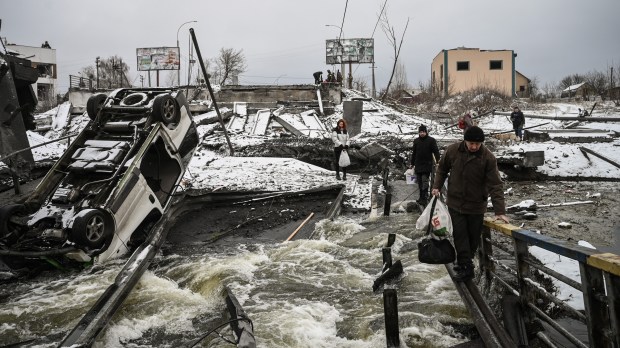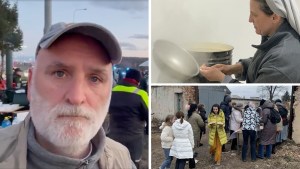As Russian forces continue to attack Ukrainian cities with rockets, missiles and aerial bombardments, civilian deaths have been reported and people are running low on food and other supplies. And the number of refugees into countries to the West of Ukraine is approaching 700,000.
Caritas Ukraine President Tetiana Stawnychy said Tuesday night, nearly a week after Russia invaded Ukraine, that relief agencies like hers will need to get supplies into cities that are being targeted or threatened by military action.
“Part of the country is in extreme suffering. We’re going to have to get supplies to them soon, because that’s a humanitarian disaster brewing right there,” she said in an interview from Lviv in Western Ukraine.
Caritas is affiliated with the Ukrainian Greek Catholic Church, while Caritas Spes is affiliated with the Latin Catholic Church in Ukraine. At a press briefing earlier in the day, Fr. Vyacheslav Grynevych, director of Caritas Spes, described Kyiv as a ghost town, where shops are empty and people are only allowed to go out for a few hours a day to buy food. Fr. Grynevych is coordinating the rescue operations for thousands of inhabitants stranded at home without food, or refugees in the metro.
Both Caritas officials called for international humanitarian corridors to be opened for refugees.
“We are in contact with the authorities to seek to evacuate the children in safety,” as far as possible from the potential targets of the Russian bombardments, Grynevych said, as reported by the i.media news agency. He gave the example of a center in which 650 children are cared for, where there’s a capacity for only 400.
Solidarity
Filippo Grandi, the U.N.’s refugees point man, warned on Tuesday that many more vulnerable people will begin fleeing if Russia’s military offensive continues and further urban areas are hit, the Associated Press reported. U.N. humanitarian coordinator Martin Griffiths said shelling and bombing have already damaged water pipes, electricity lines, and basic services. “Hundreds of thousands of families are without drinking water,” he said.
Stawnychy, in an interview, said the Russian military action was increasingly affecting civilian populations. “They destroyed part of an orphan village” run by another relief agency, she said. “They’re not doing [just] military targets anymore. I think there are a lot more casualties than we hear about. Also around Mariupol, they’ve been bombing into the city, shooting Grad missiles, which are not precise.”
But she said she’s been heartened by reports of the show of solidarity among civilians who are soldiering through the ordeal.
“I can’t express enough this kind of solidarity you see: neighbors helping one another, checking on one another,” she said, citing one example of people in the Kyiv apartment building of friends of hers who were “walking around and trying to offer psychological help to the people who were left behind.”
“I met one of our staff members who just arrived in Lviv after a 20-hour trek from Kyiv,” Stawnychy added. “She was driving with her mom, and they pulled into Ternopil (in Western Ukraine), and there were volunteers handing out hot tea and cookies, and her mom just broke down in tears because of the kindness that people show after what they’d gone through. Just that beautiful witness.”
Stawnychy said that Caritas, in the weeks leading up to the feared invasion, had prepared for the massive flow of refugees that is now taking place. “We went through the steps of what would be needed,” she said. “So we have welcome centers, to help people in transit. They’re providing food, hot tea, water, a place to sleep, a place to shower. There’s also been some resettlement through the city governments. All the Caritas centers are working closely with the city government.
“And then, for three days one of our teams has been going out to different points along the border,” she continued. “We’ve got some tents we’ve set up, some heaters, hot food, hot tea. For a while it was really bad because it was women and children standing in long lines. They’ve been talking about the need for benches and chairs, maybe something for the kids.”
Gradually, the long lines of people on foot are beginning to be replaced by people in cars, but there will still be needs. “They were also trying to see if we could set up something a little more systemic about that, so we were working with one of the UN agencies, to do an assessment with them about what was needed.”
Trauma
What is beginning to worry Stawnychy and Fr. Grynevych is the psychological effect the war is beginning to have on people.
“War-wounded hearts will never be healed,” Fr. Grynevych said at the press briefing, emphasizing that the pain and fear people have felt will be very difficult to overcome.
“It’s a huge trauma, for all people,” Stawnychy added. “And above all, I see a lot of parents who are struggling to help their children through this ordeal, and who run into the basements as soon as the air raid sirens sound.”



